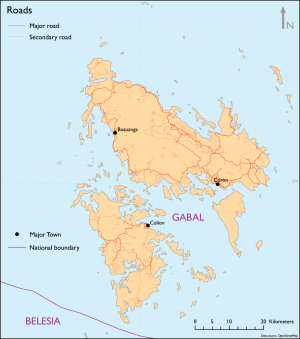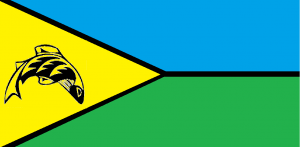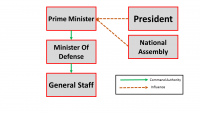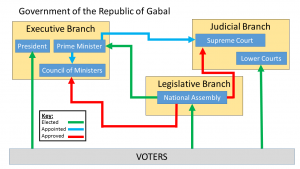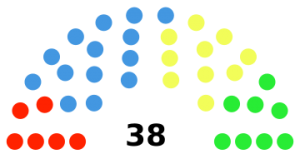Difference between revisions of "Political: Gabal"
Marvel.brad (talk | contribs) (→Description of Government) |
Hunt.james (talk | contribs) m (Updated page categories) |
||
| Line 124: | Line 124: | ||
| − | [[Category:DATE | + | [[Category:DATE]] |
| − | [[Category: | + | [[Category:Pacific]] |
| − | [[Category: | + | [[Category:Gabal]] |
[[Category:Political]] | [[Category:Political]] | ||
Revision as of 17:47, 11 April 2018
This page is a section of Gabal.
The Republic of Gabal is a relatively new democracy, having emerged from joint rule by two Western European countries in 1977. Gabal faces numerous political and economic challenges that have undercut the effectiveness and legitimacy of its government since independence was declared. Tribal politics run deep within the government and the country is deeply federalized among tribal lines. Issues associated with climate change, however, have largely united the country in recent years, as Gabal, along with many other small island nations, seek to influence global climate change politics.
Contents
Political History
Early History
Gabal was populated by unaffiliated and often hostile indigenous tribes, whose presence on the island date from prehistory. Gabal was first discovered by Europeans in 1750 by a South Seas expedition. This expedition established a trading post on the main island, which quickly grew into a permanent settlement. Soon after, traders from multiple European countries began making use of the settlement as a trading hub for their operations in the South Pacific, bringing a variety of different influences. This dynamic: an independent island populated by unaffiliated tribes, featuring a robust multinational European trading presence, existed peacefully for over a century.
In 1862, with the supply of cotton from the American South cut off by the embargoes and blockades of the American Civil War, Europe looked abroad for colonies that could support cotton plantations. Gabal, with its tropical climate and volcanic soil, appeared to be an ideal candidate. Two European colonial powers negotiated joint administration of the island, establishing the two-culture government that would endure through independence.
Cotton did not end up becoming a significant cash-crop for the new colony, however, coffee and fruit plantations were established with some success. Most planation labor was provided by natives, whose legal and economic status rested somewhere between western chattel slaves and factory laborers. By the turn of the 20th century, coffee and fruit had been replaced almost entirely by native hardwood logging as the chief export of the island. Native Gabalians had few legal rights and no representation in government, and the split between colonies of different nationalities led to tensions between both white and native residents. This tension was rising consistently and may have led to open conflict had WWII not intervened.
Independence
The Gabal independence movement began in earnest during WWII. Gabal was strategically located to support Allied operations in the South Pacific, and soon after hostilities began, Allied soldiers arrived in large numbers to defend the island and build facilities to support air and naval operations. After American entry into the war, much of this responsibility was passed to American servicemen, who likewise occupied the island in large numbers. Interacting with Americans on a wide scale for the first time helped to grow emerging nationalist feelings; by the end of the war, native Gabalians had established a full scale independence movement. This coincided with the widespread dissolution of the European empires following the war, and Gabal began negotiations for self-rule in 1956.
Negotiations dragged on for many years, complicated by the discovery of large chromium deposits. European colonizers were hesitant to leave the island prior to establishing mining operations to extract the chromium, but as time passed pressure increased as natives established local political parties and began to formally organize an anti-colonial movement. An incident in 1974 brought the tension to a head, when a small group of tribesmen conducted an armed takeover of the country’s main airport, demanding immediate independence and self-rule. European governments both refused to send troops to the island to put down the insurrection, so borrowed police forces from a nearby neighbor were used. This incident caused local Gabalian political leaders to demand either proper support from the exiting colonial powers, or self-rule. Both traditional colonial powers immediately rescinded colonial claims to the islands. Gabal gained its independence in 1977; the first Gabalian elections were held that same year.
Modern Gabal
Early independent Gabalian politics were dominated by friction between factions descended from different European colonial occupiers. Tribes had aligned with colonial and business concerns based largely on random geography; now tribes aligned into political parties based around their traditional colonial affiliation. There was comparatively little in the way of domestic political issues in Gabalian elections. Instead, the government took on a strong trend of clientelism, with each elected representative working to bring resources back to his specific district and not necessarily representing the best interests of the country as a whole. This, coupled with traditional tribal loyalties, created a strongly federalist tone to Gabalian politics, with little in the way of national unity. This created a situation where the federal Gabal government was wildly unstable throughout the mid-1980s and 1990s.
Climate change was the first issue that created true national unity in Gabal. Starting in the late 1990s, a series of devastating storms coupled with rising sea levels and the effects of total deforestation of the nation’s valuable tropical timber created a groundswell of ecology-focused political parties. Gabal joined the Small Island Developing States (SIDS) coalition and adopted their mantras of sustainability, renewable energy, and combating man-made climate change. Since that time, climate change has become the most significant threat, and the dominant international political issue in Gabal.
Centers of Political Power
The tribe remains the center of politics in Gabal. Political parties are formed around tribal lines, elected officials typically represent constituents from a tribal perspective. Tribal leaders are often, but not always, elected to leadership positions, but virtually all political dialogue centers around tribal politics.
The focus placed on tribal representation creates significant instability in political parties. Rather than establishing large, long-lived parties, parties in Gabal tend to be almost ad-hoc, assembled for one electoral period to represent a particular tribal issue, and are then often dissolved or reorganized following the next election. This instability manifests itself in regular votes of no-confidence and dissolutions of parliament.
Military Authority
Gabal’s military is small and non-expeditionary. Its primary missions are patrolling Gabal’s territorial waters, providing a persistent ground security presence, and building military partnerships with friendly and allied nations. Primary military authority is held by the prime minster, and exercised through the cabinet, specifically through the Minster of Defense and the general staff. The military budget is prepared by the general staff, then submitted by the Minster of Defense for approval by the National Assembly.
Family Authority
Gabalian family life is very traditional and rooted in the tribal institution. Families tend to be large and patriarchal, with the father acting as the political head of the family unit. Gabal granted universal suffrage soon after the establishment of the new free government, but women, especially married women, seldom exercise their political freedom. Family law is likewise traditional and patriarchal, which further marginalizes the female population politically. This dynamic is changing somewhat in urban areas, with women having an increased political presence.
Religious/Clerical Authority
Despite being overwhelmingly Christian, Gabal recognizes freedom of religion and a general separation of church and state. There is little religious conflict or persecution on Gabal, although elements of the government strongly resist the presence or visitation of modern foreign missionaries.
Description of Government
The Gabal government is a parliamentary representative democracy that employs a traditional three-branch structure, with checks and balances established between each branch. Though the official government is wholly democratic, a traditional system of tribal politics unofficially influences every branch of government.
Branches of Government
Legislative
Gabal’s national legislative body is called the National Assembly. It is unicameral, with two members elected from each of 13 electoral districts, and an additional 12 members chosen from a national pool. Elections occur every four years, or upon a dissolution of the government by the Prime Minister. Gabal has numerous and rapid-changing political parties; forming coalition governments has been a consistent challenge and legislative gridlock is common as a result. Members of the legislature are often proxies for tribal leadership, and vote in accordance with the wishes of tribal leaders.
In addition to the formal legislature there is a Council of Chiefs, an informal gathering of tribal leaders. While this body has no official constitutional power, it advises every element of government and is highly influential. The population sees the Council of Chiefs essentially as a second legislative body, one charged with protecting Gabalian traditions and culture. In this sense, it can be viewed almost as an upper house of legislature.
Current Political Parties
Gabal's political parties are in constant motion: parties and coalitions sometimes last only a single election cycle and rarely last more than a few years. The current party structure within the NA is as follows:
- Democratic-Republican Party: A centrist party whose main platform is development of Gabal's infrastructure and education systems.
- Social Christian Party: A center-right party whose main platform is job creation and economic expansion through tourism and foreign investment.
- Tribal Caucus: A Gabal nationalist party whose platform is the preservation of the traditional Gabal tribal structure.
- Green Party: A center-left party whose main platform is preservation of Gabal's ecology and participation in the global ecology movement.
Broadly speaking, urbanized and semi-urbanized areas tend to vote for parties favoring greater international involvement and development, while rural areas tend to vote for more traditionalist platforms.
Executive
Gabal employs a semi-presidential executive branch. The president is the head-of-state, and is directly elected by the population. The president’s constitutional powers are very limited, and the position’s internal responsibilities are largely ceremonial. However, the president is Gabal's international representative, with an agenda determined by the legislature and approved by the Prime Minster. Given Gabal's increased diplomatic activity over the last decade, the prominence of the president has increased. Presidential elections used to be largely irrelevant affairs given to ceremonial votes; today they are highly contested and closely followed. Gabalians expect the president to represent the country effectively on the international stage and strive to select the best statesperson for the job.
The Prime Minister (PM) is the head-of-government, elected by a majority vote of the National Assembly. The PM then appoints the seven members of the cabinet, called the Council of Ministers. This is the body that fills the majority of the executive functions. Tradition dictates that some members of the Council be from different political parties than the PM; often these members are taken from the Council of Chiefs. The PM holds significant domestic power in Gabal. He or she appoints ministers, sets the legislative agenda, and is the face of the government to most of the populace. Choosing the PM has become a major political exercise for the NA: negotiations between parties are usually intense and protracted, with each party trying to secure ministerial positions in exchange for PM votes.
Judicial
The Gabalian court systems is based on Common Law. The Supreme Court consists of three members, appointed by the PM and approved by the National Assembly. They hear only high-profile cases, such as those concerning the Gabalian constitution. Lower level courts are local to electoral districts, with judges elected by district constituents. There is no formal appeals-level to the Gabalian court system; if appeals are required, they are heard by other lower level courts.
Though Gabal's courts are to be strictly impartial and unaffiliated, the fact that lower court judges are chosen by direct election makes them susceptible to tribal politics. Historically, judges were occasionally chosen based on the perception of favoritism towards certain tribes or peoples. This process has minimal federal oversight. The debate about how best to amend this system is ongoing.
Political Parties and Organizations
Gabal's political parties are largely temporary and ad-hoc: there have been well over 100 different registered political parties since Gabal gained independence. Parties constantly change names and alliances, both during and in between election cycles. Parties are aligned with tribes and generally vote in accordance with their affiliated tribal leadership.
In order for a party to appear on a ballot, it must register with the Council of Ministers. This registration includes identifying party leaders and a statement of platform. Though the constitution dictates that nearly all political parties must be approved, Council members have resisted or refused to identify parties based on tribal rivalries or other political considerations. This in turn led to significant friction between branches of government. Calls to remove this process are becoming louder, and the constitution may be amended to remove this authority from the Council of Ministers in the near future.
Gabal also has several informal but influential non-party political organizations. The most prominent are conservation-related: Green Gabal, and The Island. Both of these organizations lobby for greater ecological awareness on Gabal, and for greater involvement in the international green movement. A pro-tourist organization, the Gabal Tourism Chamber, has also gained considerable influence over the last several years. Acting essentially as an advocate for Gabal's merchant class, the Tourism Chamber seeks to expand tourism to Gabal. This has occasionally put them into conflict with the ecological groups, as tourist businesses often seek use of wildlife preservations and protected areas of ocean.
Government Effectiveness and Legitimacy
The Gabalian government struggled with stability from the very beginning. Balancing the system of a western-style democracy with the inertia of ancient tribal politics led to discord, gridlock, and near-constant infighting. The formal government also struggles with the perception of its legitimacy versus tribal institutions; for much of the population, especially those in more impoverished areas, tribal authority exceeds that of the elected government. This rarely reached the level of violence, however: instability in Gabal takes the form of political infighting, votes of no-confidence, and government/representative turnover.
In recent years, increased water and air access, improved internet and television access, and emergence of significant national issues such as climate change, foreign investment, and tourism management, increased the stability and influence of the national government. This trend projects to continue: traditional tribal power will be gradually displaced by national political authority.
Domestic Political Issues
Domestic Political Objectives
Gabals’s three primary domestic political objectives are 1) build a sustainable economy based around tourism and exports, 2) develop and integrate all parts of the island chain, and 3) prepare the population and infrastructure for the anticipated effects of climate change. All major political parties formulate their positions along these lines; the primary differences between parties lie in the rank order of the three objectives.
Elections
Gabal holds general elections every 4 years, or upon the dissolution of government by the PM (usually following a vote of no-confidence). Provinces make their own rules for local elections; election cycles typically either mirror national elections, or are in alternating two-year windows.
Rule of Law
Gabal’s government and population takes their constitution very seriously. Though the country often experiences political instability, the rule of law is viewed as very important by all elements of society. Politicians and tribal leaders alike are expected to abide by and uphold the constitution; charges of high-level corruption or extra-legal activity are serious matters and are often career-ending.
Corruption
Low-level corruption, particularly among police forces and local officials, is extremely common in Gabal, so much so that they are viewed as practically quasi-legal. Public servants are often not paid living wages, and thus income from bribe and graft are considered integral to the function of government. This kind of corruption is mostly limited to the lowest political echelons, however; corruption at the national level is uncommon and highly frowned upon. Gabalians do not generally view foreign investment or aid controlled by politicians as corrupt in nature, though they tend to be skeptical of foreign investors due to the country's long history of exploitation by foreign powers.
Human Rights and Freedoms
As an independent republic, Gabal has an excellent human rights record despite political instability and limited resources. Racial, religious, and political persecution are virtually nonexistent. Police are generally well overseen by national authorities, even in remote and rural areas. Freedom of speech, religion, and assembly are guaranteed by the constitution, and the government generally follows these precepts. Tribal dynamics are more obscure: freedoms within the tribal construct, especially for women, can be somewhat more restrictive. However, poor wages and exploitative business practices within private companies (specifically mining companies) have come under scrutiny in recent years, especially from international human rights organizations. Though technically legal, the poor treatment of workers is an emerging political issue in Gabal, one that may heavily influence future politics.
International Political Issues
International Political Objectives
Gabal’s three primary international political objectives are 1) ensure an open, available market for the tourism and export economy, 2) locate and develop opportunities for foreign investment foreign aid, and 3) participate fully in the global coalition to combat climate change.
Regional Political Issues
Gabal’s most significant regional concern is maintaining peace and political stability in the South Pacific in order to encourage international tourism to the region. This involves limited participation in regional security organizations, the building of local partnerships to encourage security, and cultivation of relationships with larger nations to help enable regional stability.
Global Political Issues
Gabal views climate change as the dominant global political issue. They participate actively in numerous climate change organizations, and much of their diplomatic capital is spent on the climate change issue. As a matter of policy, Gabal seeks out partnerships with larger nations that they view as most aggressive on the climate change issue.
Relationship with the US
Gabal has a cordial but limited relationship with the United States. The US does not contribute significant foreign aid to Gabal, nor is it a major trading partner. However, Gabal recognizes the influence that the US has with numerous international financial aid organizations, and thus has sought a generally positive relationship. The US does not have an embassy in Gabal, but maintains diplomatic ties; likewise, Gabal does not have an embassy in the US.
In recent years, the Gabal military began an informal cooperative relationship with the United States military. This relationship began during cooperation efforts while on UN military missions; positive feedback led Gabali officers to recommend pursuing enhanced military relations with the US. At present this is limited to officer training visits to US military facilities and training courses, but may be expanded to include active unit-level participation and cooperation. Gabal's membership in the Non-Aligned Movement likely precludes any formal military alliance with the US.
Alliances and International Organizations
Gabal’s most important international political organization memberships are the Non-Aligned Movement, the Coalition of Low-Lying Atoll Nations on Climate Change (CANCC), the Global Environment Facility (GEF), and Small Island Developing States (SIDS ). These are all coalitions of small island nations focused on the specific issues facing these types of countries. Gabal is noted as a leader in the CANCC. Gabal is a member of the United Nations and participates regularly in UN activities, to include military. Gabal is also a member of several other major international organizations, including the International Monetary Fund (IMF), the World Trade Organization (WTO), and the Pacific Islands Forum.
Gabal recently implemented a Defense Cooperation Program (DCP) with Australia, wherein the Australian military provides advisors and trainers to the Gabal armed forces. This is the first relationship of this type in Gabal's history.

